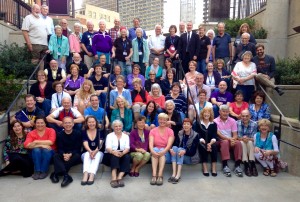 On October 9-10, 2015, John was in Denver, Colorado, working with the Trinity United Methodist Church Choir and Judith Mitchell, their director. John and the Trinity Choir have made music together several times over the years both in Denver but also in New York’s Carnegie Hall and Washington DC’s Kennedy Center for the Performing Arts. Judith invited John to serve as clinician for Trinity’s Choir Retreat that weekend. The Trinity Choir will be offering John’s Christmas Cantata, “What Child is This” for their special music in December. John spent Friday evening and most of Saturday working the choir on the music. It was fast paced and intense but great fun! The choir rose to the challenge and sang great! Thanks to all the members of the Trinity Choir who helped make the weekend memorable. Special thanks to Judith, Kathy, Caroline, Harold, Jan, and Diane.
On October 9-10, 2015, John was in Denver, Colorado, working with the Trinity United Methodist Church Choir and Judith Mitchell, their director. John and the Trinity Choir have made music together several times over the years both in Denver but also in New York’s Carnegie Hall and Washington DC’s Kennedy Center for the Performing Arts. Judith invited John to serve as clinician for Trinity’s Choir Retreat that weekend. The Trinity Choir will be offering John’s Christmas Cantata, “What Child is This” for their special music in December. John spent Friday evening and most of Saturday working the choir on the music. It was fast paced and intense but great fun! The choir rose to the challenge and sang great! Thanks to all the members of the Trinity Choir who helped make the weekend memorable. Special thanks to Judith, Kathy, Caroline, Harold, Jan, and Diane.
During one of the choir breaks, Judith Mitchell read the following excerpt written by a former choir president about John’s cantata. Thanks to John Smith for his permission to reproduce it here. That excerpt follows.
Excerpt from John Smith’s “A Note from the Pres…” from the Chancel Choir Board News dated February 2003…
The Leavitt cantata reconciles a lot of worlds. It mixes dance styles with carols, Latin with English, scripture with poetry, medieval with modern, and all kinds of unexpected shifts of meter, dynamics, harmony, and emotion. Even the centerpiece, “What Child is This?” combines a secular tune with a sacred text, to which the composer has added a Celtic counter-melody with the mystic influence of open chords sung on pure vowels. Nevertheless, that centerpiece provides the critical organizing principle for the whole cantata, by focusing on the simple reverence of the nativity.
All this makes the Leavitt cantata a work for our age. Our society values freedom of expression, which means that we constantly receive a bewildering variety of messages and freedom of choice, which means that each one of us must choose how to respond to all of those options. Finding an organizing principle for life in the midst of such chaos is a daunting task. Singing in the choir, and especially that last few months of writing and speaking to the choir as your president, has given me lots of opportunities to concentrate on how I organize my own life and what I organize it around. I am an amateur musician, even more so an amateur at philosophy and theology, but an amateur, defined literally from its Latin root is simply one who loves whatever he or she is doing.